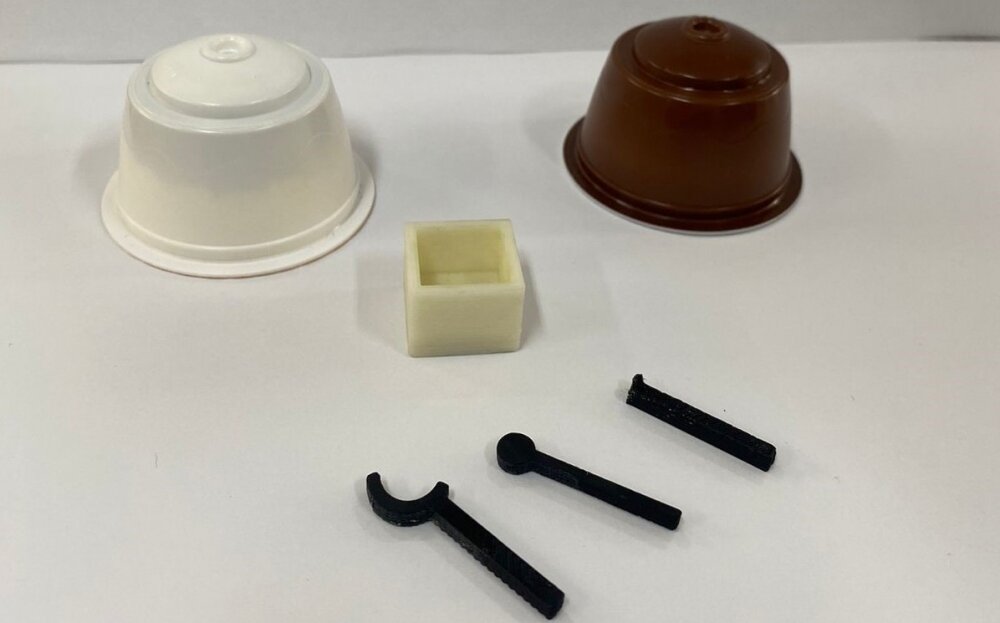Used pods and examples of parts produced by 3D printing, also called additive manufacturing. Credit: Bruno Campos Janegitz/UFSCar
An article published in the journal ACS Sustainable Chemistry & Engineering brings good news for coffee buffs: the plastic in used coffee pods can be recycled to make filament for 3D printers, minimizing its environmental impact.
The solution was successfully tested by research groups in Brazil at the Federal University of São Carlos (USFCar) and the State University of Campinas (UNICAMP), and in the United Kingdom at Manchester Metropolitan University (MMU).
“We produced new conductive and non-conductive filaments from waste polylactic acid [PLA] from used coffee machine pods. There are many applications for these filaments, including conductive parts for machinery and sensors,” Bruno Campos Janegitz, a co-author of the article, told Agência FAPESP. Janegitz heads the Sensors, Nanomedicine and Nanostructured Materials Laboratory (LSNano) at UFSCar in Araras, São Paulo state.
Brazil is the world’s leading producer and exporter of coffee, as well as its second-largest consumer after the United States. Although most coffee consumed in Brazil is low-quality (Coffea canephora, also known as robusta coffee, with a high proportion of defects and impurities disguised by high roasting of beans and plenty of sugar or sweetener in the cup), demand for gourmet and specialty coffees is steadily growing.
Comprising selected arabica beans (Coffea arabica) with a lower roast to preserve their natural sugars, aroma and flavor, gourmet coffees score 75-80 on the scale used by the Brazilian Coffee Industry Association (ABIC), which goes from 0 to 100. Specialty coffees must also have what is called a socio-environmental certification and score at least 80 on the scale used by the Brazilian Specialty Coffee Association (BSCA).
The quality of the beverage also depends on how it is prepared, and many Brazilians have begun to use the cafetière (also known as French press) or stove-top Moka pot (caffettiera in Italian) instead of the traditional cloth or paper filter. Portable electric espresso machines that use pods are also increasingly popular, albeit far more expensive. The problem with the latter is what to do with used pods.
Although reusable pods exist and some suppliers promote recycling of aluminum pods, most consumers just throw used pods into the garbage bin, especially if they are made of plastic. Considering all the factors involved, calculations made by the São Paulo State Technological Research Institute (IPT) show that “a cup of pod coffee can be as much as 14 times more damaging to the environment than a cup of filter coffee.”
To develop uses for this waste, the researchers produced electrochemical cells with non-conductive filaments of PLA and electrochemical sensors with conductive filaments prepared by adding carbon black to the PLA. Carbon black is a paracrystalline form of carbon that results from incomplete combustion of hydrocarbons. “The electrochemical sensors were used to determine the proportion of caffeine in black tea and arabica coffee,” Janegitz explained.
Production of filament is relatively simple, he added. “We obtain the non-conductive material simply by washing and drying PLA pods, followed by hot extrusion. To obtain the conductive material, we add carbon black before heating and extrusion. The extruded material is then cooled and spooled to produce the filament of interest,” he explained.
The process is a good example of the circular economy, in which the waste produced by an economic activity is not treated as a problem that harms the environment but converted into resources to implement another activity. “The polymer base obtained from used pods can generate devices with a great deal of added value,” Janegitz said.
More information: Evelyn Sigley et al, Circular Economy Electrochemistry: Creating Additive Manufacturing Feedstocks for Caffeine Detection from Post-Industrial Coffee Pod Waste, ACS Sustainable Chemistry & Engineering (2023). DOI: 10.1021/acssuschemeng.2c06514
Citation: Used coffee pods can be recycled to produce filaments for 3D printing (2023, May 3) retrieved 8 May 2023 from https://phys.org/news/2023-05-coffee-pods-recycled-filaments-3d.html
This document is subject to copyright. Apart from any fair dealing for the purpose of private study or research, no part may be reproduced without the written permission. The content is provided for information purposes only.

